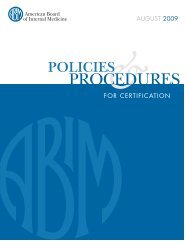The SRA Symposium - College of Medicine
The SRA Symposium - College of Medicine
The SRA Symposium - College of Medicine
Create successful ePaper yourself
Turn your PDF publications into a flip-book with our unique Google optimized e-Paper software.
Papers<br />
Introduction<br />
Certification programs are designed to confirm that individuals in a given pr<strong>of</strong>ession possess the<br />
fundamental knowledge necessary to serve their employer and pr<strong>of</strong>ession in the best possible<br />
manner. Gilley and Galbraith (1986) define certification as the process by which a pr<strong>of</strong>essional<br />
organization or an independent external agency recognizes the competence <strong>of</strong> individual practitioners.<br />
<strong>The</strong>re is <strong>of</strong>ten a great deal <strong>of</strong> confusion associated with the term certification. For example, Bratton<br />
and Hildebrand (1980) emphasize that pr<strong>of</strong>essional certification should not be confused with<br />
teacher education certification because the term teacher certification is a misnomer. Instead, it<br />
is a licensing mechanism regulated by a local body. Since teachers are required to hold a valid<br />
certificate in order to teach in the public school system, the teacher education certification is, in<br />
reality, a license to teach. Parker and Smith (2004) report that processes established for certifying<br />
and licensing practitioners share important credentialing related commonalities, but the primary<br />
difference <strong>of</strong>ten misunderstood is that licensure is mandatory and certification is voluntary. Galbraith<br />
and Gilley (1985) contend this confusion biases many educators regarding the certification<br />
issue and narrows the examination and discussion <strong>of</strong> pr<strong>of</strong>essional certification. Penland (1982)<br />
asserts that this confusion has resulted in misunderstanding and frustration on the part <strong>of</strong> those<br />
concerned with the topic <strong>of</strong> pr<strong>of</strong>essional certification and has impeded communication. Galbraith<br />
and Gilley (1985) maintain that certification, licensure, and accreditation each attempt to regulate<br />
the measurement <strong>of</strong> competencies, however; the methodology, population, and purposes <strong>of</strong><br />
regulations differ. For example, in McCue (2003), Schoon and Smith indicated that licensure is the<br />
granting <strong>of</strong> a license by a governmental body to practice a pr<strong>of</strong>ession, while certification is thought<br />
<strong>of</strong> as a means <strong>of</strong> promoting achievement within a discipline. Certification is not a property right to<br />
practice a pr<strong>of</strong>ession; instead, it is a voluntary achieved standard <strong>of</strong> excellence for an individual.<br />
According to Bratton and Hildebrand (1980) certification is <strong>of</strong>ten perceived as being the same as<br />
accreditation and licensure. Distinctions between certification, accreditation, and licensure need<br />
to be recognized in order to place pr<strong>of</strong>essional certification in correct context and avoid confusion<br />
in use <strong>of</strong> terminology. <strong>The</strong> following table provided by Bratton and Hildebrand (1980) <strong>of</strong>fers a succinct<br />
comparison <strong>of</strong> accreditation, licensure, and certification.<br />
Table 1<br />
Comparison <strong>of</strong> Accreditation, Licensure, and Certification<br />
Type <strong>of</strong> Credential Recipient <strong>of</strong> Credential Credentialing Body Required or Voluntary<br />
Accreditation Programs Association/Agency Voluntary<br />
Licensure Individuals Political Body Required<br />
Certification Individuals Association/Agency Voluntary<br />
Bratton and Hildebrand (1980) <strong>of</strong>fer the following definitions to help clarify the distinctions between<br />
certification, accreditation, and licensure.<br />
Certification – the process by which a pr<strong>of</strong>essional organization or an independent external<br />
agency recognizes the competence <strong>of</strong> individual practitioners.<br />
Accreditation – the process whereby an agency or an association grants public recognition to<br />
a school, college, or university, or specialized study program that meets certain predetermined<br />
qualifications or standards.<br />
222 2005 <strong>Symposium</strong> Proceedings Book

















